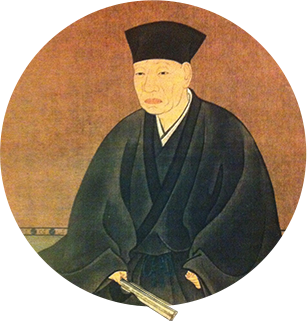
Sen Rikyu
Sen Rikyu was born in 1522 and died in 1591.
Rikyu was born in Sakai (now Osaka). He is one of the most influential figures in the history of Japan. Rikyu changed the way people looked at the Japanese tea ceremony and created the wabi-cha aesthetic. Wabi-cha represents the aesthetics or beauty of the "imperfections" in life. Rikyu simplified his beliefs into four principles that defined the "Way of Tea".
His four concepts are: wa, kei, sei and jaku

Wa (Harmony)
A feeling of closeness with nature and people.

Kei (Respect)
A feeling of thankfulness to everyone and everything around them.

Sei (Purity)
A physical and spiritual sense of cleanliness and orderliness.

Jaku (Tranquility)
A feeling of "silence" that can be obtained by studying Tea, if you have reached the previous stages of Harmony, Respect, and Purity.
Later In life, Rikyu starting using very small tea rooms with only 2 tatami mats. After he developed his Wabi-cha philosophy, Rikyu started using black Raku tea bowls . Raku is a method that uses a quick but low heat process to create ceramics. Once Raku tea bowls were in place, he implemented other ideas like flower containers, tea scoops, utensils made of bamboo and other simple daily life items.

Sen Rikyu built a tea room called Tai-an in the 16th century. Tai-an is a 2-tatami mat tea room located in Myokian Zen temple in Kyoto, Japan. This is the only tea room built by Sen Rikyu that still stands to this day. It's also the oldest tea room in Japan. Tai-an is now a national treasure in Japan. Your required to give a 1 month reservation notice to view this tea room but even then you cannot go inside the tea room. This is one of Japan's most famous artifacts and the reason I chose to name my Matcha company after Sen Rikyu and his historical tea room Tai-an.
Sadly, do to imperative disagreements between Rikyu and a powerful lord named Toyotomi Hideyoshi. Hideyoshi sentenced Rikyu to commit suicide on February 2nd, 1591. Rikyu was a tea master under Hideyoshi for many years. Even after his death, Hideyoshi still passed on the philosophy and aesthetics Rikyu left behind.
His philosophy on the Japanese tea ceremony transformed the Japanese culture forever and how others looked at life itself through his beliefs of Wabi-cha. His philosophy and practices are still imprinted in tea rooms all throughout Japan. His life will continue to live through each generation of his family Lineage. In fact, there has been 13 generations of family decedents after Rikyu died that has passed down his legacy from generation to generation.

